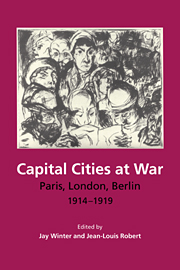Book contents
- Frontmatter
- Contents
- Note on joint authorship
- List of figures
- List of tables
- Part 1 Premises
- Part 2 The Social Relations of Sacrifice
- Part 3 The social relations of labour
- Part 4 The social relations of incomes
- 8 Material pressures on the middle classes
- 9 Wages and purchasing power
- 10 Transfer payments and social policy
- Part 5 The social relations of consumption
- Part 6 Urban demography in wartime
- Part 7 Towards a social history of capital cities at war
- Statistical appendix and tables
- Bibliography
- Index
8 - Material pressures on the middle classes
Published online by Cambridge University Press: 15 December 2009
- Frontmatter
- Contents
- Note on joint authorship
- List of figures
- List of tables
- Part 1 Premises
- Part 2 The Social Relations of Sacrifice
- Part 3 The social relations of labour
- Part 4 The social relations of incomes
- 8 Material pressures on the middle classes
- 9 Wages and purchasing power
- 10 Transfer payments and social policy
- Part 5 The social relations of consumption
- Part 6 Urban demography in wartime
- Part 7 Towards a social history of capital cities at war
- Statistical appendix and tables
- Bibliography
- Index
Summary
Introduction
This chapter examines the impact of the war on sections of Berlin, London, and Paris society outside the manual working class. It is therefore concerned with vast and heterogeneous populations – ranging from lowly junior clerks to company managers; from small shopkeepers to powerful industrial magnates; or from poor widows living on income from a few government bonds to wealthy rentiers drawing income from extensive holdings in stocks and shares or in real estate. In all three cities this last group tended to possess substantial land and property in the country – so that in a sense its identity was as much rural as urban. Indeed, in London ‘fashionable society’ remained dominated by the upper gentry down to the Great War. Although, according to British sensibilities, this elite was almost the antithesis of ‘middle-class’, they will be included none the less in this discussion for the sake of comparability.
Given the remarkable diversity of the metropolitan ‘middle classes’, it is hardly surprising that their experience of war was highly diverse – not only because of objective differences in levels of wartime hardship, but also because individuals handled these hardships in varied ways, influenced partly by the distinctive cultural traditions of different social or religious groups, and partly by more individual psychological factors. In particular we must never forget that war often brought personal tragedy – in the form of bereavement – that could wholly overshadow material experiences of hardship or prosperity.
As this chapter will demonstrate, for the middle classes, the lottery of the wartime economy offered the prospects of great riches for some alongside crippling losses for many others.
- Type
- Chapter
- Information
- Capital Cities at WarParis, London, Berlin 1914–1919, pp. 229 - 254Publisher: Cambridge University PressPrint publication year: 1997



